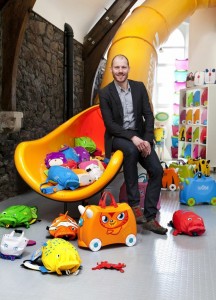The Bristol-based firm behind the top-selling Trunki child’s ride-on suitcases has lost its long-running legal battle with a rival to protect its design.
Five Supreme Court judges analysed a dispute between Magmatic, which makes Trunki, and PMS International, which sells Kiddee Case luggage, at a hearing last November. Magmatic had contended that the PMS products breached its intellectual property (IP) rights. 
In a judgment released this week the judges ruled against Magmatic. Trunki designer Rob Law said he was “devastated and bewildered” by the ruling and intellectual property lawyers immediately warned it would have a profound implications in the design world.
Magmatic had argued that the Kiddee Case suitcases that were decorated to look like animals or insects infringed its registered design rights. The firm’s Community-registered design for its Trunki suitcases covers various colours but does not cover surface decoration.
Magmatic won its initial claim against PMS in the High Court in 2013 but the Court of Appeal later reversed the decision and found in favour of PMS.
The original Trunki ride-on suitcase was launched in 2006 by Mr Law, pictured in Magmatic’s Bristol base. He was famously turned down on Dragons’ Den but the suitcases are now so popular that a Trunki is sold every minute somewhere in the world.
His firm Magmatic now sells the cases in thousands of stores across the UK as well as around 100 countries overseas and Mr Laws has become one of the region’s best-known entrepreneurs.
In delivering the judgment Lord Neuberger – the UK’s most senior judge – said: “I have sympathy with Mr Law of Magmatic, it was a clever idea but design right is intended to protect designs not ideas.”
Rob Law said: “We are devastated and bewildered by this judgment, not just for ourselves but for the huge wave of uncertainty it brings to designers across Britain.
“We created an original product in Trunki and protected it by computer-generated registered design – a process used to protect a third of designs across Europe.
“In my honest opinion, the Trunki was willfully ripped off. We stood up to this behaviour, held it to account and took our case all the way to the highest court in the land – only for the judges to rule that we are not protected against the copy.”
Key figures in the design community leapt to Trunki’s defence within minutes of the ruling. Dids Macdonald, chief executive of Anti Copying in Design, told the City AM website: “This is a travesty and plunges design law into an abyss and will foster widespread confusion for UK.”
Industry figures were backing Trunki and Rob Law on Twitter via #ProtectYourDesign.
Kiddee Case founder Paul Beverley called the ruling was a “victory for fair competition”.
He added: “It upholds the right of consumers to be able to choose competitively-priced products. We try always to work within the law and successive courts have agreed that there is no way our popular Kiddee Case can be mistaken for any other product.”































